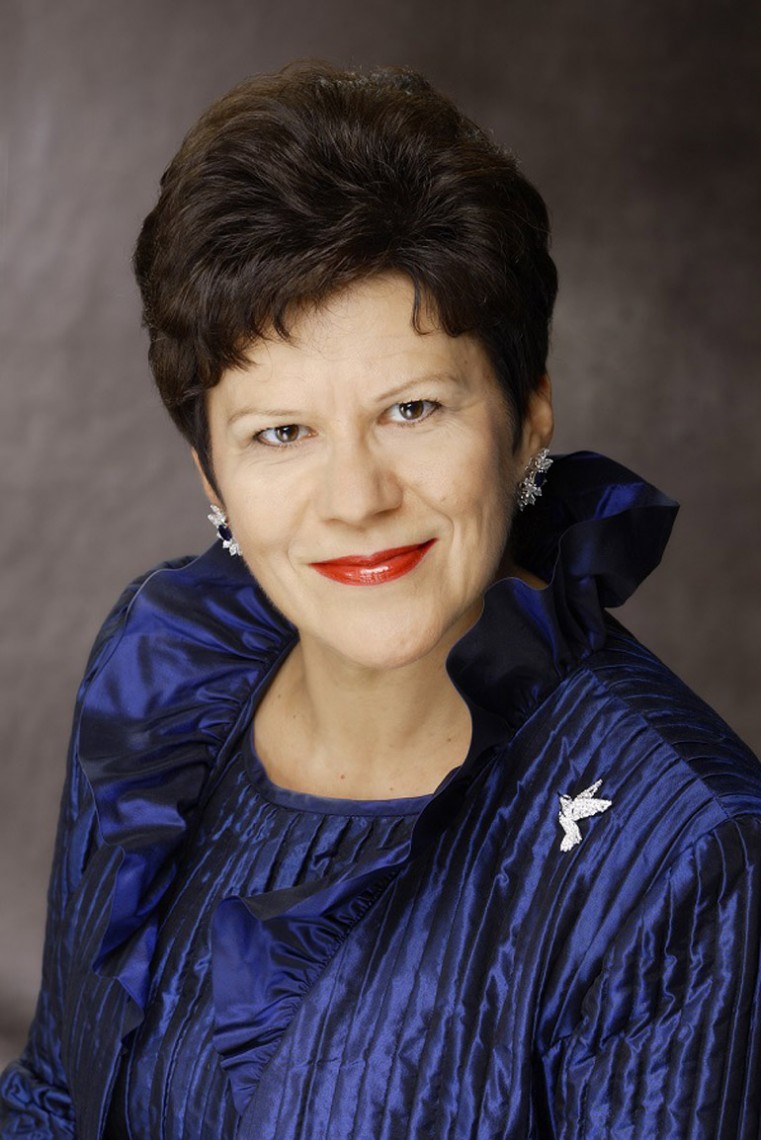
For voice fans, a major highlight of the 2017 Toronto Summer Music Festival—ongoing until August 5—is the return of Finnish soprano Soile Isokoski, as a mentor in the Art of Song program (she was last here two summers ago.) On Sunday afternoon, a very good-sized audience gathered in Walter Hall to see Isokoski the teacher in action. I got there very early, to be sure to get a good seat. As the organizers were setting up the stage, with the customary little table and chair for the teacher, Isokoski asked to have it moved off the stage to the front row of the theatre where she preferred to sit.
This little gesture speaks volumes. For her, the stage, the spotlight, should be on the performer, not the teacher. What better way to see how a student is doing than from the vantage point of the audience? Isokoski sat in the same spot as she did two years ago. I believe it underscores her philosophy as a teacher. It’s all about the student. She’s “passing the torch;” it is her role to encourage, to guide, to nurture, and to bring the best out of each student. Throughout the session, she couldn’t have been more encouraging and supportive, generous with her praise when warranted. When things needed improvement, she was to-the-point and direct but always kind and gentle.
Typical of a masterclass, the singer is asked to introduce the song with a few words about the text and the context, then singing it through once. Then it’s broken down into small chunks to be worked on with the teacher. The session concludes with a second complete run-through. Isokoski, like most teachers in a masterclass situation, stresses diction, expression, and interpretation, while essentially staying away from issues of technique—rightfully so in my mind, as the master-teacher isn’t around when the student runs into trouble. She would occasionally make suggestions on breathing and phrasing. With a few pointers here and there, the singing invariably improved in the second run-through.
Adam Harris started with Schubert’s “Der Lindenbaum” from Die Winterreise, alongside Chelsea Whitaker at the piano. Harris has an attractive, naturally produced, warm, soft-grained lyric baritone, and he sang the Schubert beautifully. Isokoski gave him pointers on diction, expression (reminding him to have ‘a smile in the tone’ here or ‘not too sad’ there). She stressed the importance of singing with legato. He followed with “Illala” by Kilpinen, a lovely lyrical song, very traditional and melodically inspired. Harris sang with mellifluous tone, and Isokoski complimented him on his Finnish diction, high praise indeed!
Harris was followed by soprano Bahareh Poureslami, with Amy Seulky Lee at the piano. She has a gleaming soprano of lovely timbre, evenly produced. She sang Strauss’s “Freundliche Vision,” followed by “Auch kleine Dinge” by Hugo Wolf. Isokoski worked mainly with the Strauss, and a little bit on the Wolf, focusing on diction, expression, and tempi. It’s not easy to be up on that stage and make instant adjustments in front of an audience. It’s enough to unnerve anyone, let alone a young student. Poureslami did very well. Isokoski wanted the singer to prepare the breath before the phrase. Any time technique is involved, it can be very daunting, as singing really involves muscle memory and cannot be changed at the flip of a switch. If a slight tremolo crept in occasionally in her rendition of the Wolf song, it was completely understandable!
Then it was mezzo Evanna Lai’s turn, with Jack Olszewski at the piano. A very confident and well-prepared singer, Lai chose two unfamiliar songs, the dramatic and powerful “Marssnon” by Sibelius, followed by “Talvikuutamolla” by Madetoja. Isokoski worked on the phrasing with the mezzo. The second song is very atmospheric and Lai captured its essence well. The last singer in the masterclass was soprano Megan Miceli, who sang “Glückes genug” by Strauss, and “Norden” by Sibelius, with Jared Tehse at the piano. Miceli has a bright, pure, well focused high lyric soprano, with admirably steady and evenly produced tone, and capable of a nice high piano. Both the Strauss and the Sibelius are ideal as each requires long, sustained flow of sound, which Miceli did admirably well. The Strauss song ends with the soloist holding the word “Glückes” for eight beats, and Miceli has the steady tone to do it justice, rock steady and without excessive vibrato, drawing praise from Isokoski. Her purity of tone was also ideal in the Sibelius, totally undaunted by its sustained high tessitura. Her singing once again brought praise from Isokoski. It was a lovely end to an afternoon of song.
For more REVIEWS, click HERE.
#LUDWIGVAN
- SCRUTINY | Opera Atelier’s All Is Love Makes Triumphal Return - April 15, 2024
- SCRUTINY | From The Heart: Ema Nikolovska And Charles Richard-Hamelin Offer Unique Program At Koerner Hall - March 26, 2024
- SCRUTINY | The Glenn Gould School Spring Opera Presents A Superb Dialogues Des Carmélites - March 22, 2024



